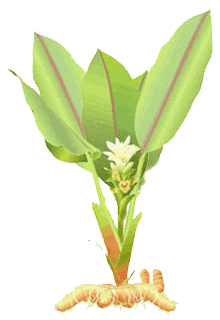Turmeric is one of the most favored herbs in our family apart from garlic and onion. My dad cooks the yummiest braised turmeric chicken and I can never get enough of it. Our girls love their grandpa’s turmeric chicken too, cooked using lots and lots of freshly chopped turmeric, alongside onions and garlic. The only turn-off when eating turmeric is the yellow pigment that stains our teeth and toothbrush! But my dad has zilch complain that his fingers would turn yellow, making him look like a Minion each time he cooks a dish with fresh turmeric. That’s my dear papa’s labor of love for us.
I use turmeric powder almost daily in my cooking. I add it to fish for pan-frying, chicken for grilling and pan-frying and fried rice. My friend drinks a concoction called Golden Milk, made from Golden Paste for health purposes. I have yet to try it and am very tempted to attempt to now after reading the health benefits of Golden Milk.

Turmeric, the main spice in curry, is arguably the most powerful herb on the planet at fighting and potentially reversing disease. It has so many healing properties that currently there have been 6,235 peer-reviewed articles published proving the benefits of turmeric and one of its renowned healing compounds curcumin.
This puts turmeric on top of the list as one of the most frequently mentioned medicinal herbs in all of science and the next most popular studied herbs including garlic, cinnamon, ginseng, ginger and milk thistle.
Turmeric is a spice that comes from the turmeric plant. It is commonly used in Asian food. You probably know turmeric as the main spice in curry. It has a warm, bitter taste and is frequently used to flavor or color curry powders, mustards, butters, and cheeses. But the root of turmeric is also used widely to make medicine. It contains a yellow-colored chemical called curcumin, which is often used to color foods and cosmetics.
According to the Journal of the American Chemical Society, turmeric contains a wide range of antioxidant, antiviral, antibacterial, antifungal, anticarcinogenic, antimutagenic and anti-inflammatory properties.
It is also loaded with many healthy nutrients such as protein, dietary fiber, niacin, Vitamin C, Vitamin E, Vitamin K, potassium, calcium, copper, iron, magnesium and zinc. Due to all these factors, turmeric is often used to treat a wide variety of health problems.

Turmeric contains the chemical curcumin. Curcumin and other chemicals in turmeric might decrease swelling (inflammation). Because of this, turmeric might be beneficial for treating conditions that involve inflammation.
The active compound curcumin is believed to have a wide range of biological effects including anti-inflammatory, antioxidant, antitumor, antibacterial, and antiviral activities, which have shown a lot of potential for use in clinical medicine.

Of the 6000+ studies referencing curcumin, the most interesting finding is that when turmeric is compared to conventional medicine its benefits equal that of many pharmaceutical medications.
In fact, a number of studies have even reported that using curcumin is moreadvantageous than certain prescription drugs.

Health Benefits of Turmeric
When examining the research, turmeric benefits go beyond that of these 10 drugs:
- Anti-inflammatory drugs
- Anti-depressants (Prozac)
- Chemotherapy
- Anti-coagulants (Aspirin)
- Pain killers
- Diabetes drugs (Metformin)
- Arthritis medications
- Inflammatory bowel disease drugs
- Cholesterol drugs (Lipitor)
- Steroids
A study done by Drugs in R & D found that curcumin was equal or more effective than diabetes medications at reducing oxidative stress and inflammation in the treatment of high cholesterol.
Studies like these are causing pharmaceutical companies to try and design a synthetic form of curcumin that unfortunately, will not work as well as the real thing.
Uses
Turmeric is used for arthritis, heartburn (dyspepsia), joint pain, stomach pain, Crohn’s disease and ulcerative colitis, bypass surgery, hemorrhage, diarrhea, intestinal gas, stomach bloating, loss of appetite, jaundice, liver problems, Helicobacter pylori (H. pylori) infection, stomach ulcers, irritable bowel syndrome (IBS), gallbladder disorders,high cholesterol, a skin condition called lichen planus, skin inflammation from radiation treatment, and fatigue.
It is also used for headaches, bronchitis, colds, lung infections, fibromyalgia, leprosy, fever, menstrual problems, itchy skin, recovery after surgery, and cancers. Other uses include depression, Alzheimer’s disease, swelling in the middle layer of the eye (anterior uveitis), diabetes, water retention, worms, an autoimmune disease called systemic lupus erythematosus (SLE), tuberculosis, urinary tract infection (UTI), and kidney problems.
Some people apply turmeric to the skin for pain, ringworm, sprains and swellings, bruising, leech bites, eye infections, acne, inflammatory skin conditions and skin sores, soreness inside of the mouth, infected wounds, and gum disease.
Turmeric is a natural antiseptic and antibacterial agent and can be used as an effective disinfectant. If you have a cut or burn, you can sprinkle turmeric powder on the affected area to speed up the healing process. Turmeric also helps repair damaged skin and may be used to treat psoriasis and other inflammatory skin conditions.
WOW, the health benefits of the humble and inexpensive turmeric are so wide! If you are turned off by the yellow pigment from the turmeric root that can stain your hands, blender and kitchen top while peeling and chopping them, try using turmeric powder. Turmeric powder is very convenient to use and does not stain your hands.
